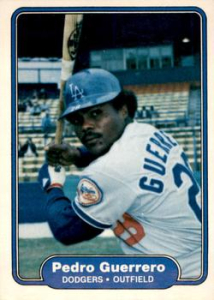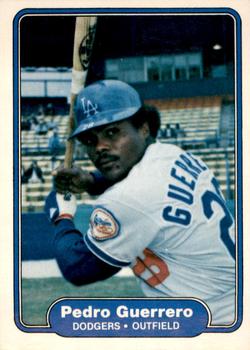June 30, 1985: Pedro Guerrero ties monthly home run record; Steve Howe ends Dodgers’ career
 Pedro Guerrero was hitless in 11 consecutive at-bats. In a 162-game season, three games without hitting safely is not atypical, but Guerrero was wrapping up an exceptional month, already having hit 14 home runs, one short of the National League record for June.
Pedro Guerrero was hitless in 11 consecutive at-bats. In a 162-game season, three games without hitting safely is not atypical, but Guerrero was wrapping up an exceptional month, already having hit 14 home runs, one short of the National League record for June.
Entering the final day of the month, the Los Angeles Dodgers trailed the division-leading and defending National League champion San Diego Padres by six games. The current series with the Atlanta Braves hadn’t gone well; Guerrero was hitless in his previous three games, including two with the Braves. Although the Dodgers had pulled out a 3-2 win the previous day, they nearly squandered the lead in the top of the ninth when Bob Horner followed Dale Murphy’s single with a home run. Tom Niedenfuer relieved Jerry Reuss to get the final out, moving to a Sunday afternoon series decider at Dodger Stadium.
The game pitted Pascual Pérez for Atlanta, winless in nine starts, against Dodgers righty and future Cy Young Award winner Bob Welch.
Welch had yet to hit his stride either, posting a 1-1 mark in four prior starts after missing time early in the season with a sore elbow.
As an additional distraction, pitcher Steve Howe was a no-show for the Dodgers.
If the midseason matchup between the National League West Division’s third- and fifth-place teams was begging for a storyline, this one was unexpected. Howe had missed the entire 1984 season even though he was reinstated June 1, 1984, from a drug-related suspension, but returned to the Dodgers’ major-league roster in 1985, achieving modest results, appearing in 19 games with a 4.91 earned-run average.
His absence, after he showed up late for a game a week before, was unexpected for Dodgers manager Tom Lasorda.
“It stuns me,” Lasorda said. “I thought the young man was doing well. To see that happen is terrible.1
But as it turned out, Howe’s vanishing act had little impact on the players.
“I didn’t even know he wasn’t here,” Guerrero said. “I don’t follow people who come here late. That’s the manager’s and the coaches’ job.”2
As play ensued, the early innings of the matchup were uneventful.
The Dodgers took a 1-0 lead in the second on three hits, with Steve Sax driving in first baseman Greg Brock. Guerrero was hitless in his first two at-bats, extending his streak to 13 at-bats without hitting safely.
It was the Braves’ turn in the fifth. Through four innings, Welch had surrendered three hits and no runs, but home runs by Claudell Washington and Dale Murphy bookended Rafael Ramírez’s single to give Atlanta a 3-1 lead. Lasorda stuck with Welch, who struck out to lead off the bottom of the inning as the Dodgers went down in order.
Rick Camp replaced Pérez in the bottom of the sixth, setting down the Dodgers in order, including a fly out by Guerrero for his third hitless trip to the plate. The score remained 3-1.
In the bottom of the seventh, the Dodgers mounted a challenge. With one out, Mike Scioscia walked and Sax reached on an error by Braves second baseman Glenn Hubbard. Lasorda removed Welch in favor of pinch-hitter Al Oliver, who singled to drive in Scioscia. The unearned run moved Los Angeles closer to the Braves. Dave Anderson hit into a double play to end the inning.
With Welch out of the game and Howe unavailable (he entered a few games earlier with an identical score against the Padres), Lasorda turned to Ken Howell. Howell had made 25 previous appearances and set the Braves down in order in the eighth without a ball leaving the infield.
In the bottom half of the inning with the heart of the order coming up for the Dodgers, Atlanta manager Eddie Haas brought in future Hall of Famer Bruce Sutter to replace Camp. Sutter retired Mariano Duncan, but Ken Landreaux singled, bringing Guerrero to the plate. Sutter had a streak of five saves in his five previous appearances.
“Our best against their best,” Washington later commented.3
Guerrero smoked Sutter’s second pitch into the left-field pavilion, tying the major-league record for homers in June, previously held by Babe Ruth (1930) and Roger Maris (1961) of the New York Yankees and Bob Johnson (1934) of the Philadelphia A’s.
“I don’t remember the last time I had a moment like this,” said Guerrero, at this point 8-for-19 lifetime against Sutter. “To hit a homer in my last chance. … I have to sit back and think about it. How did I do it?”4
The record stood until Sammy Sosa shattered it with 20 home runs in June 1998.
The Braves had a final chance in the ninth when Gerald Perry led off with a walk against Howell. With Chris Chambliss pinch-hitting for catcher Bruce Benedict, Perry stole second as Chambliss struck out. With one out, Albert Hall, who entered the game in the eighth with Sutter, hit a slicing fly to left field that Guerrero ran down. Running on contact, Perry was doubled off second by Guerrero to end the contest.
The Braves left Los Angeles feeling shortchanged for their efforts.
“We made stupid mistakes that cost us these games,” Braves third baseman Horner said. “Physical errors are one thing, but stupid mistakes. … We can’t afford them in our position.”5
Los Angeles dealt with the Howe situation promptly, promoting pitcher Dennis Powell from Albuquerque to fill his roster spot. Howe was released a couple of days later, with Los Angeles honoring the balance of his $325,000 salary, and offering to provide any medical assistance sought by Howe.
Most importantly, Lasorda lauded Guerrero, even though he thought Pedro was too conscious of hitting the record home run, accounting for his struggles the prior three games. “But he made contact with that ball,” Lasorda said. “It jumped out of here. That’s one of the great single achievements a hitter could ever accomplish, and it meant a lot to the team.”6
Momentum from the win kick-started Los Angeles to a 20-7 record in July. The Dodgers overtook San Diego in the standings on July 13 and never relinquished the lead the rest of the season, winning the division by 5½ games over the Cincinnati Reds. San Diego finished in a third-place tie with Houston, 12 games back.
With Guerrero’s hot June, he was selected for the All-Star Game but didn’t show up in the box score. His slugging cooled down: He hit only 14 home runs the rest of the season, but he posted career highs in home runs (33), on-base percentage (.422), and slugging percentage (.577), leading the league in the latter two categories as well as on-base plus slugging (OPS) percentage (.999).
After winning the division, the Dodgers fell to the St. Louis Cardinals in the National League Championship series, four games to two.
Sources
In addition to the sources cited in the Notes, the author consulted Baseball-Reference.com, Retrosheet.org, and SABR.org.
https://www.baseball-reference.com/boxes/LAN/LAN198506300.shtml
https://www.retrosheet.org/boxesetc/1985/B06300LAN1985.htm
Notes
1 Gordon Edes, “Guerrero Ends Month With a Game-Winner,” Los Angeles Times, July 1, 1985: 29.
2 “Guerrero Ends Month With a Game-Winner.”
3 Gerry Fraley, “Guerrero HR helps LA top Braves 4-3,” Atlanta Constitution, July 1, 1985: 65.
4 “Guerrero HR helps LA Top Braves 4-3.”
5 “Guerrero HR helps LA Top Braves 4-3.”
6 “Guerrero Ends Month With a Game-Winner.”
Additional Stats
Los Angeles Dodgers 4
Atlanta Braves 3
Dodger Stadium
Los Angeles, CA
Box Score + PBP:
Corrections? Additions?
If you can help us improve this game story, contact us.


